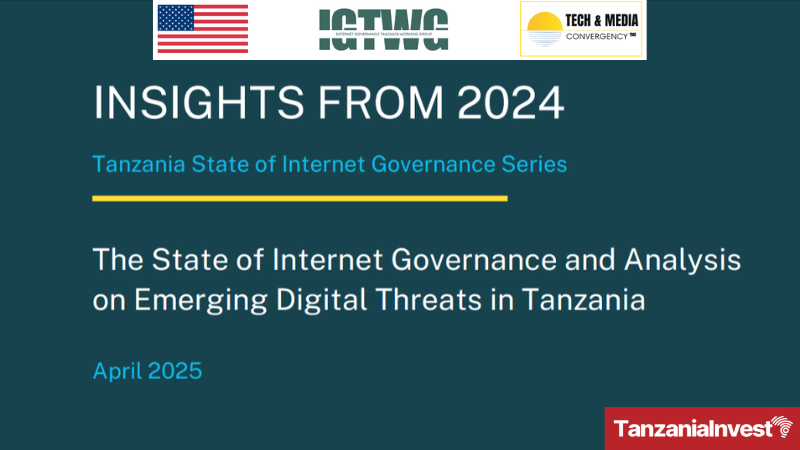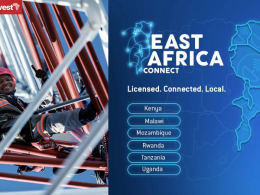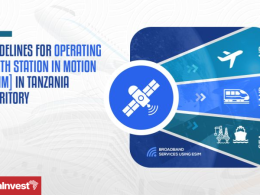A comprehensive report examining the state of internet governance and emerging digital threats in Tanzania has been released, shedding light on significant economic impacts from internet disruptions and ongoing challenges within the regulatory environment.
The study, titled “The State of Internet Governance and Analysis on Emerging Digital Threats in Tanzania,” was produced by Tech & Media Convergency (TMC) in partnership with the Internet Governance Tanzania Working Group (IGTWG) and supported by the U.S. Embassy in Tanzania.
It provides a critical analysis of the digital landscape as of 2024, emphasizing the need for responsive and rights-respecting governance, particularly as the country approaches the 2025 general elections.
The report quantifies the substantial economic effect of internet instability, estimating a loss of approximately USD 1.4 million due to internet disruptions recorded in the first quarter of 2024 alone.
These disruptions, totaling around 1,116 hours, impacted an estimated 14 million internet users across the nation, underscoring the vulnerability of connectivity and its direct financial consequences.
These disruptions not only impact freedom of expression and access to information but also damage investor confidence and the growth of the digital economy.
Beyond connectivity issues, the analysis delves into the digital rights climate, finding that 53% of documented digital rights-related incidents in 2024 were categorized as regressive.
These incidents included platform restrictions, internet shutdowns, surveillance concerns, content takedowns, and cyberattacks, indicating persistent pressure on digital freedoms.
The study points to specific legislative frameworks, such as the Cybercrimes Act of 2015 and the Electronic and Postal Communications (Online Content) Regulations of 2020, noting concerns about their broad language and potential impact on freedom of expression and privacy.
Furthermore, the report highlights the implications of the Personal Data Protection Act (PDPA) of 2022, particularly its data localization requirements under Section 26, which mandates the storage of certain personal data within Tanzania, posing potential compliance challenges and costs for businesses, especially international investors.
The report also notes developments regarding potential new entrants to the internet market.
It states that several international Internet Service Providers (ISPs), including Starlink, have applied for permits to operate in Tanzania.
The Tanzania Communications Regulatory Authority (TCRA) announced in November 2024 that these companies are seeking national network facilities and application services licenses, according to the report.
The document mentions that such satellite technology could provide high-speed internet to underserved areas and help bridge the digital divide, while noting the need to address spectrum rights and data protection regulations.
Emerging digital threats such as ransomware, phishing attacks, and data breaches were also identified as significant concerns requiring robust cybersecurity measures from both the public and private sectors.
The report implicitly conveys the perspectives of civil society organizations and digital rights advocates involved in its creation, emphasizing the urgent need for multi-stakeholder collaboration to address the identified challenges.
It underscores the importance of balancing national security concerns with the fundamental rights of citizens in the digital sphere.
The findings suggest a call from these stakeholders for clearer regulations, stronger data protection enforcement, and a commitment to maintaining an open and accessible internet, particularly during sensitive periods like elections.
The involvement of the U.S. Embassy suggests international partner interest in supporting a stable and rights-respecting digital environment in Tanzania.
Tanzania has experienced significant growth in internet penetration over the past decade, with mobile internet being the primary mode of access for the majority of the population.
This digital transformation brings economic opportunities but also governance challenges, as highlighted by the TMC/IGTWG report.
The regulatory landscape governing the internet and digital activities has evolved rapidly, often drawing scrutiny from digital rights groups regarding its impact on freedom of expression, privacy, and access to information.
Previous instances of internet slowdowns or shutdowns, particularly around election periods, have raised concerns domestically and internationally.
The report concludes by calling for a coordinated, multi-stakeholder approach involving legal reforms, institutional strengthening, investment in digital capacity, and alignment with regional and international standards to support Tanzania’s broader socio-economic development agenda.










